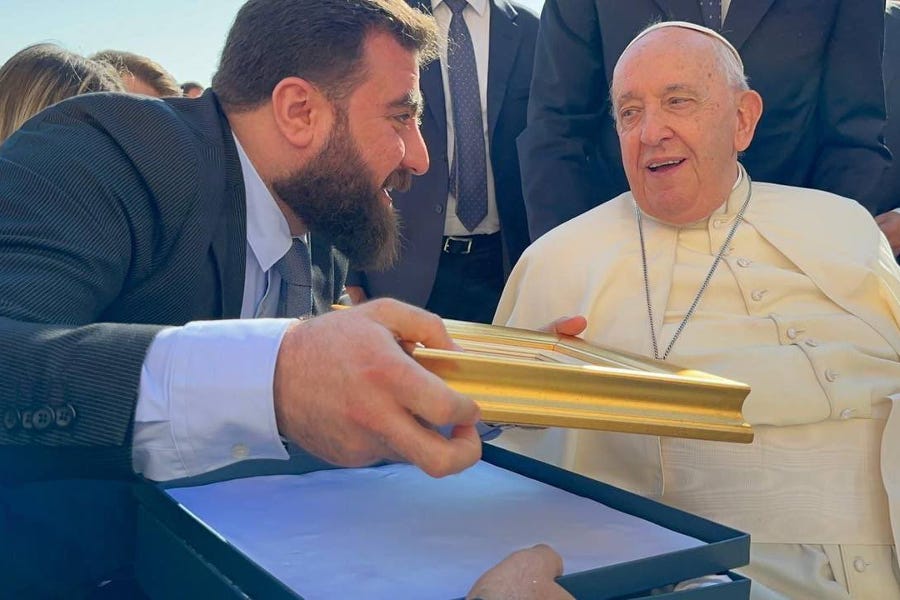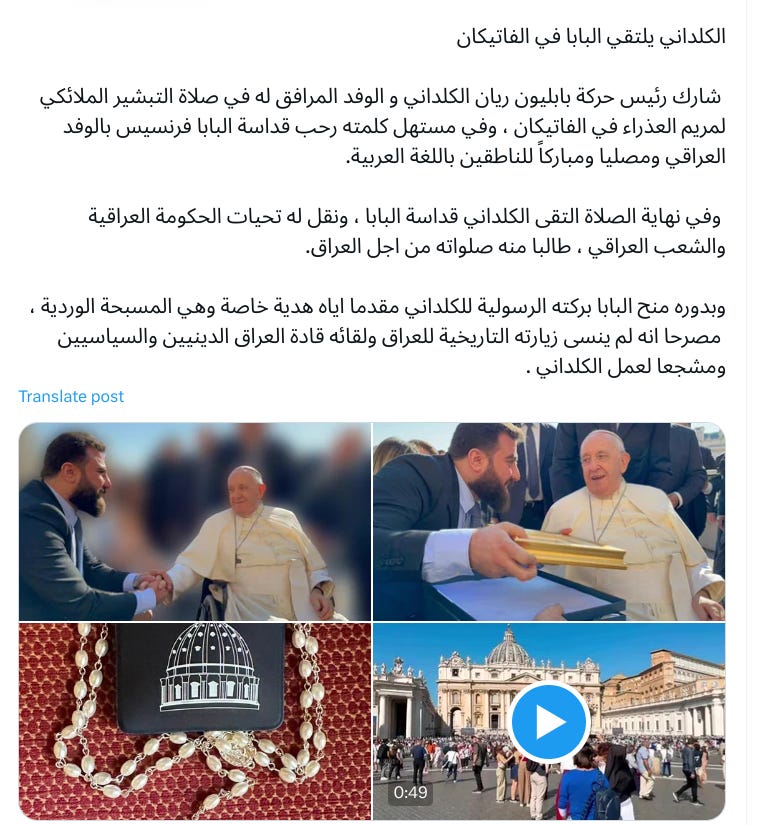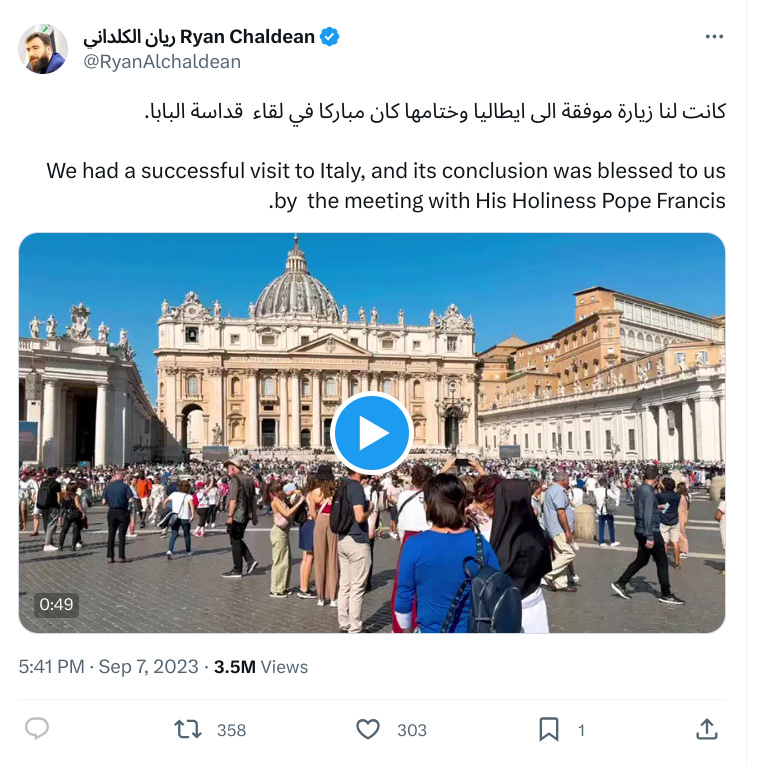A militia leader who clashed with an Iraqi cardinal has been accused of “photobombing” Pope Francis at a general audience and attempting to present his picture with the pope as evidence of a private papal audience.

The Vatican confirmed Sept. 12 that Rayan al-Kildani — who the head of the Chaldean Catholic Church blames for sabotaging Church-state relations in Iraq — met with the pope at last Wednesday’s general audience in St. Peter’s Square and engaged in a brief exchange of words.
The Washington Institute, a think tank based in the U.S. capital, accused al-Kildani of falsely portraying the fleeting encounter as a personal audience.
It claimed that the militia leader had “photobombed” the pope to bolster his credentials among Iraqi Christians. It also said that an “amateurishly edited” photograph of the meeting, with background figures blurred out, was circulated online.
Al-Kildani, who was placed on a U.S. sanctions list for allegedly cutting off a handcuffed detainee’s ear, engaged in a war of words earlier this year with Cardinal Louis Raphaël Sako, the leader of the Chaldean Catholic Church.
Sako told The Pillar last month that he believed al-Kildani had influenced Iraqi President Abdul Latif Rashid’s decision to revoke a decree recognizing the cardinal as the head of Chaldean Catholics and the person responsible for its assets.
The move prompted Sako to leave the Chaldean Catholic Church’s headquarters in Baghdad and relocate to Iraqi Kurdistan.
Al-Kildani, who leads both Iraq’s 50th Brigade militia and the Babylon Movement political party, publicized his Sept. 6 meeting with the pope via his media office and social media networks.
–
—
A report on the encounter by the Iraqi News Agency was headlined “Al-Kaldani [Al-Kildani] hands the Pope Francis a gift from the heritage of Mesopotamia.”
It said: “At the beginning of his speech, Pope Francis welcomed the Iraqi delegation, praying and blessing the Arabic speakers. Al-Kaldani met the Pope, gave him a gift from the heritage of Mesopotamia, and conveyed to him the greetings of the Iraqi government and the Iraqi people, asking him for his prayers for Iraq.”
“He pointed out that ‘the Pope gave Al-Kaldani his apostolic blessing and gave him a special gift, which is the blessed Rosary, saying that he’ did not forget His historic visit to Iraq, his meeting with Iraq’s religious and political leaders, and an encouragement to the work of Al-Kaldani, who works for peace among all Iraqis.”
Al-Kildani posted a video montage of his trip to the Vatican on the social network X, formerly known as Twitter. In a caption, he wrote: “We had a successful visit to Italy, and its conclusion was blessed to us by the meeting with His Holiness Pope Francis.”
—
Commenting on the papal encounter, the Washington Institute said: “The framing of the incident is deeply deceptive because it seeks to portray the incident as a substantive personal meeting at the invitation of the Vatican rather than what it was: an unplanned encounter at a weekly event open to the general public.”
Rayan al-Kildani (Rayan the Chaldean) is strongly identified with the Babylon Brigades, a militia originally founded by Iraqi Christians to fight Iraq’s Islamic State occupiers.
In 2017, the organization was integrated into the Popular Mobilization Forces (PMF), an umbrella body representing more than 60 armed factions backed by the Iraqi state, where it became known as the 50th Brigade. The PMF is dominated by Shia Muslim groups.
In 2019, the U.S. Treasury Department said it had added al-Kildani to its sanctions list after a video circulated in May 2018 showing the militia leader slicing a handcuffed detainee’s ear.
It also said that the 50th Brigade had “systematically looted” homes in Batnaya, a village in Iraq’s Nineveh Plains, reportedly seized and sold agricultural land illegally, and faced allegations of “intimidation, extortion, and harassment of women.”
Al-Kildani, who claims to represent the interests of the country’s Chaldean minority through the Babylon Movement, had a high-profile confrontation earlier this year with Cardinal Sako.
He accused the cardinal of “establishing parties, engaging in electoral battles, and jeopardizing the security and future of Christians in Iraq.”
Sako, in turn, said that al-Kildani was “self-aggrandizing and wants to become a leader.”
In response to social media attacks on the cardinal, more than 200 Christians gathered in Baghdad’s central Tahrir Square May 12 to show their solidarity. Agenzia Fides reported that the gathering was “disrupted by the arrival of an organized group of people who came to shout offensive slogans against Patriarch Sako.”
A video showed the cardinal’s supporters moving to one side of the square while another group carrying banners appearing to display crossed-out portraits of Sako stood behind a security cordon.
On July 3, President Rashid rescinded a 2013 decree recognizing Sako as the head of the Chaldean Church “in Iraq and the world” and “responsible for the assets of the Church.”
In a July 15 open letter, Sako announced that he was leaving Baghdad in response.
He explained that he was taking the step following a “deliberate and humiliating campaign” against him by the Babylon Brigades.
The cardinal suggested that his decision to leave the Iraqi capital would pave the way for al-Kildani to seize control of the Church’s assets and install his relatives in management positions.





